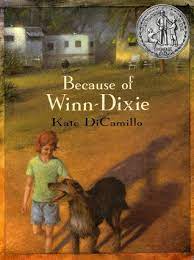Bad Words
Every school year, I read Because of Winn Dixie by Kate DiCamillo to my second-grade class. Before I started, I warned the class that the book contained a “bad” word. I had their absolute attention from then on.
The story centers on ten-year-old Opal who’s new in town and her stray dog Winn Dixie who helps her make friends. One of her new friends is the town librarian Miss Franny Block whose grandfather, Littmus T. Block, fought in the Civil War when he was fourteen-years-old.
Miss Franny tells Opal: “Littmus told his mama that he could not stand by and let the South get beat…Men and boys always want to fight. They are always looking for a reason to go to war. It is the saddest thing. They have this abiding notion that war is fun. And no history lesson will convince them differently.”
Here I would pause dramatically and again warn the students that a bad word was coming. They almost stopped breathing.
Miss Franny continues, “[Littmus] went off to be a hero. But he soon found out the truth.”
“What truth?” Opal asks.
“Why, that war is hell," Miss Franny said with her eyes still closed. "Pure hell’”
Here my students gasped. I stopped reading and said, “Yes, war is a very bad word.”
It seems that no number of history lessons has yet convinced the world that war is bad. National leaders threaten it. Troops die in it. Civilians run from it. Children get caught in the middle of it. As Miss Franny notes, “It is the saddest thing.”
War is a very bad word. There are many other bad words: abuse, neglect, racism, hunger, hatred, fear, loneliness, and poverty. Every one of these words hurts children. What “abiding notions” do we hold more sacred than our children? What lessons must we learn to erase these words from our children’s future?
What measures can we take to ensure that all children are protected from “bad” words? Do we study history? Are we aware of current events? Do we oppose actions which hurt children? Do we support policies which protect them? Do we want to find out the truth?
Along with Miss Franny, Opal and Winn Dixie befriend many of the outsiders in their little town: Gloria Dump, the town “witch” who is haunted by the ghosts of her past, Otis, a shy musician with a criminal record, the Dewberry boys who try to bully Opal and “pinch-faced” Amanda who is mourning her baby brother who drowned. Because Winn Dixie, with a dog’s true nature, does not discriminate, neither does Opal. She looks for the best in people and finds it. Because of Winn Dixie and Opal, many bad words are eliminated in their community.
Bad words are still with us. Will we be the heroes that eliminate them from our world?
(All quotes from Because of Winn Dixie by Kate DiCamillo. The book is on the list of challenged or banned books for some school districts. I encourage you to read it.)
